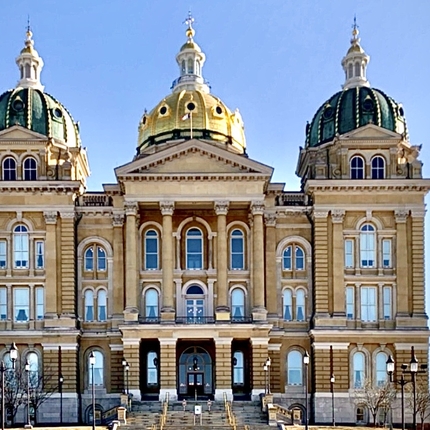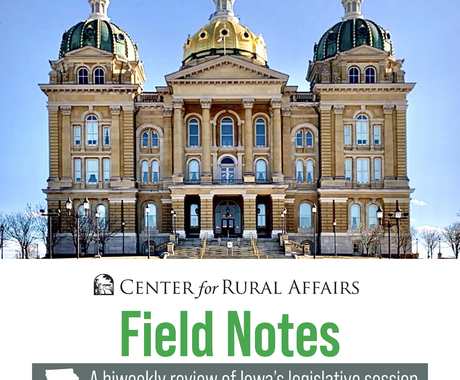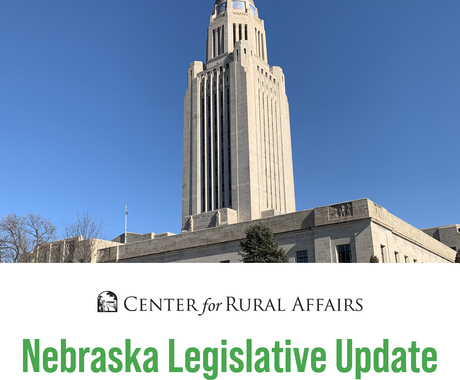By Cody Smith, former staff member
This year’s legislative session in Iowa was unprecedented. Taking place in two separate parts due to the COVID-19 pandemic, state lawmakers adjourned for the final time this year on June 14. The final action of the Legislature was to pass a mostly status quo budget that closely aligned with last year’s spending levels. While it was an unusual year and several bills we supported were shelved, all progress wasn’t lost.
With your help and support, we won legislative victories that will help build a brighter, more resilient future for rural Iowa. Your calls and emails to legislators, letters to the editor, and constant commitment to rural communities helped us win investments in renewable energy, conservation, and economic development. Since this is our last legislative update for the year, we wanted to take a moment to revisit our shared successes.
Water quality
For years, we have watched rural Iowans, including farmers, small business owners, and homeowners, grapple with the challenges posed by damaging floods and poor water quality. Just over a year ago, countless acres of farmland were covered by flood waters along the Mississippi and Missouri rivers while homeowners and small business owners rushed to salvage their property. At the same time, trends in weather data project that overall precipitation will continue to rise in Iowa. Thankfully, we have also learned from these tragedies.
Examples from around the state have shown that long-term planning at a watershed scale and investments in the staff who execute the goals of watershed plans can help us prepare for these challenges and mitigate the damage they cause. Our work with watershed coordinators, watershed management authorities, and farmers across the state helped us inform the drafting of the Local Conservation Partnerships Program (pg. 33, line 18) with Gov. Reynolds’ Invest in Iowa proposal. For the first time in state code, Watershed Management Authorities—which are led by locally-elected leaders of cities, counties, and soil and water conservation districts—were slated to be eligible funds under this proposed $15.4 million state program. Though it was shelved this year because of COVID-19, we remain committed to continuing our engagement with the governor’s office, state legislators, and our partner organizations to ensure the proposal is introduced next year.
In the interim, we will continue to engage with each of you about how we can strengthen this proposal and build support ahead of next year’s legislative session. In fact, we’ve recently released the Our Iowa, Our Water Survey to do just that. The survey is a brief 20 questions and shouldn’t take more than a few minutes to fill out. As we look forward, I hope you’ll take a few minutes to share your thoughts with us. Update: The survey is now closed.
One last-minute development during the session also brought good news. Authorization for the Resource Enhancement and Protection (REAP) program, administered by the Iowa Department of Natural Resources, was extended until 2023 and funded at a status quo level of $12 million. Without the extension, the program would have expired in 2021—leaving only one legislative session to secure its extension. REAP provides money for projects through state agency budgets and through grants. These funds are distributed through eight different programs based upon percentages that are specified in the law.
Read more about our wins here:
Analysis: Our breakdown of Iowa’s IWILL proposal
Statement: Center for Rural Affairs announces support for governor’s IWILL proposal
Clean energy
Solar energy has been rapidly growing in Iowa. Installed solar energy was at just two megawatts in 2012 and has expanded to about 115 megawatts today, according to the Energy Information Administration. During the 2019 legislative session, there was an effort—dubbed the “sunshine tax”—to gut Iowa’s solar policies that would have charged extra, misguided fees on owners of small-scale solar systems on farms, small businesses, and homes across the state.
Thankfully, after a year of negotiations between the state’s investor-owned utilities, environmental organizations, and agricultural groups, a compromise was reached and written into Senate File (SF) 583. The legislation codified net metering in state law, grandfathered existing solar customers in their current plans, and plotted a transition to a fair Value of Solar rate down the road. These new rules were passed unanimously by the Iowa House and Senate and signed into law by Gov. Kim Reynolds on March 12.
SF 583 will ensure certainty for the solar industry, customers, and the utilities going forward and is a big win for rural Iowans looking to save on energy costs. This agreement will allow for growth of solar in Iowa and increase the diversification of our state's energy portfolio, while also keeping costs low for all customers.
Read more about our wins here:
Solar compromise illuminates bright future for rural Iowa
Important links
Related stories
Solar energy shines light on innovative rural development strategy
Rural communities vulnerable to utility disconnects
Building climate resiliency story map
Protect meatpacking plant workers and our food supply
Rural location should not prevent business from receiving help
2020 Iowa Legislative Priorities




